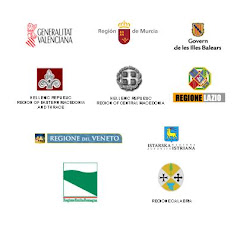Mediterranean Declaration on the European Water Vision
WORLD WATER FORUM - ISTANBUL
3rd December 2008, Castellón de la Plana, Valencian Region, Spain.
Complemented the 13th February 2009 in Evora, Portugal, by the Intermediterranean Commission of the CPRM
The European Water Vision contained in the document “Water for a Sustainable Europe – Our vision for 2030” drafted within the regional process for the World Water Forum of Istanbul, Intends to be the vision of all the Europeans and stakeholders, formulated from the point of view of the citizens and for the interest of everyone.
The Diversity is the strength of Europe, so it is necessary to complete the European Water Vision with the realities, challenges and opportunities of each of the European regions. The Political Bureau of the Intermediterranean Commission of the CPRM, gathered in Evora (Portugal) the 13th February 2009, raises the contributions and the point of view of the Mediterranean Regions to the European Water Vision.
The participants in the Mediterranean workshop held the 3rd of December in Castellón, Valencian Region (Spain), want to contribute with the Mediterranean point of view in the European Water Vision.
1. Nowhere like in the Mediterranean the water is recognized and valuated as common heritage and precious source of life, and never as a merchandise, as in the Mediterranean the water is scarce and irregular, the ecosystems are fragile and the needs and stresses on water are growing and are foreseen to increase.
2. The Water Framework Directive states that “Water is not a commercial product like any other but, rather, a heritage which must be protected, defended and treated as such”, defining the goal of protection of water. The implementation of the WFD faces different situations in each country, and this piece of legislation influences all EU and non-EU Member States.
3. The Mediterranean is a diverse space dealing with different politic, administrative, economic, natural and geographic realities (including islands and territories in analog situation) which makes that each region faces different priorities. Diverse conditions and needs require different solutions.
4. The predominant point is the interdependence, not only between States and Regions, but also between river basins and between the different uses given to the water inside each of them.
5. All scenarios show that the satisfaction of needs in a climate change environment can become increasingly difficult because of runoff decreases and cycle changes.
6. It is confirmed the need of having data, indicators and methodologies to compare and monitor the real situation of the water, given that the water is an essential resource and its current situation needs to be known with certainty.
7. The European basins in situation of water scarcity are mainly located in the Mediterranean. In these basins, additional water contributions need to be made through water transfers and, as the need may be, desalination. These additional supply measures can be adopted within an integrated and sustainable water planning, anticipating the solutions to adopt, considering the measures of water saving and efficiency as it is explained in the reports of the Committee of the Regions and the European Economic and Social Committee with regards to drought and water scarcity.
8. An integrated water management needs an integral institutional framework, with good legislation, good law enforcement, coordination and subsidiarity and improvement of the capabilities of the Public Administrations. The protection of groundwater and the integration of water issues in other policies, ensuring the horizontality to all the public Administrations, are identified as major challenges.
9. The local structures of water management for irrigation or other uses are a figure of water management specific to the Mediterranean, with historical institutions that are sometimes older than the States themselves, that may serve as example of experiences of participative and democratic management in the framework of a sustainable use of water.
10. The challenges to improve the public participation have to do mainly with legislation in some cases, better use of the technologies of information, awareness and organization of the different economic sectors to cooperate in the public decisions.
11. The specificity of the Mediterranean generates higher costs of water cycle management in all the sectors, compared with other areas of Europe. The main concerns are the quality of supplied water and the sensitivity of the most fragile sectors to the variations of water prices.
12. The Mediterranean receives flows of floating population that condition the planning of the demand and use of water. This generates additional stress on the water resources and additional costs in water supply, sanitation, treatment and protection of the water bodies that are difficult to assume by the local population. This is why the financial co-responsibility is necessary to recover the costs.
13. Regarding support technological research and innovation, the progress of water treatments and recycling, and modernization of irrigation systems are remarkable. However it is necessary to improve the access of the Mediterranean regions to funding for research and development, and for training of the different operators. The communication between economic operators to monitor and benchmark the improvements achieved, including best practices, is also necessary.
14. Although the Mediterranean citizens are increasingly aware of the water’s value, it is important to improve the education with regard to water in all the academic levels, according to each regional reality and with innovative techniques. It would be necessary to pay special attention to information and awareness to residents, tourists and people that move from one place to another.
15. Regarding to cooperation with third countries, it is necessary to pay attention to the sound water management both shores of the Mediterranean Sea, because as this is an issue that affects directly to the European coastal States.












